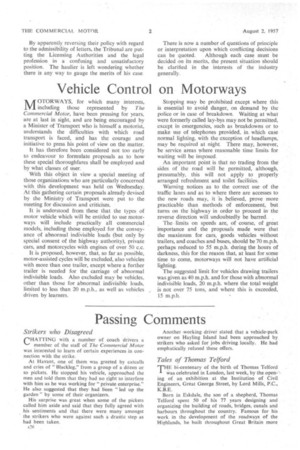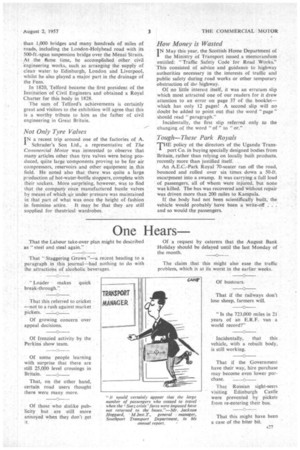Passing Comments
Page 28

Page 29

If you've noticed an error in this article please click here to report it so we can fix it.
Strikers who Disagreed
CHATTING with a number of coach drivers a member of the staff of The Commercial Motor was interested to learn of certain experiences in connection with the strike.
At Havant, one of them was greeted by catcalls and cries of "Blackleg," from a group of a dozen or so pickets. He stopped his vehicle, approached the men and told them that they had no right to interfere with him as he was working for "private enterprise." He also suggested that they had been "led up the garden" by some of their organizers.
His surprise was great when some of the pickets called him aside and said that they fully agreed with his sentiments and that there were many amongst the strikers who were against such a drastic step as had been taken.
A26
Another -working driver stated that a vehicle-park owner on Hayling Island had been approached by strikers who asked for jobs driving locally. He had emphatically refused these offers.
Tales of Thomas Telford
THE hi-centenary of the birth of Thomas Telford Was celebrated in London, last week, by the open--\ ing of an exhibition at the Institution of Civil Engineers, Great George Street, by Lord Mills, P.C., K.B.E.
Born in Eskdale, the son of a shepherd, Thomas Telford spent 50 of his 77 years designing and organizing the building of roads, bridges, canals and harbours throughout the country. Famous for his work in the development of the roadways of the Highlands, he built throughout Great Britain more than 1,000 bridges and many hundreds of miles of roads, including the London-Holyhead road with its 500-ft.-span suspension bridge over the Menai Straits. At the fame time, he accomplished other civil 'engineering works, such as arranging the supply of clean water. to Edinburgh, London and Liverpool, whilst he also played a major part in the drainage of the Fens.
In 1820, Telford became the.first president of the Institution of Civil Engineers and obtained a Royal Charter for this body in 1828.
The sum of Telford's achievements is certainly great and visitors to the exhibition will agree that this is a worthy tribute to him as the father of civil engineering in Great Britain.
Not Only Tyre Valves
IN a recent trip around one of the factories of A. 1 Schrader's Son Ltd., a representative of The Commercial Motor was interested to observe that many articles other than tyre valves were being produced, One large components proving to be for air compressors, reservoirs and other equipment in this field. He noted also that there was quite a large production of hot-water-bottle stoppers, complete with their sockets. More surprising, however, was to find that the company once manufactured bustle valves by means of which air under preSsure was maintained in that part of what was once the height of fashion
in feminine attire. It may be that they are still supplied for theatrical• wardrobes.
How Money is Wasted
• IN May this year, the Scottish Home Department of A the Ministry of Transport issued a memorandum _ entitled: Traffic Safety Code for Road Works." This consisted of advice and guidance to highway authorities necessary in the interests of traffic and public safety during road works or other temporary obstruction of the highway.
Of no little interest itself, it was an erratum slip which most attracted one of our readers for it drew attention to an error on page 37 of the booklet— which has only 12 pages! A second slip will no doubt be added to point out that the word " page " should read "paragraph."
Incidentally, the first slip referred only to the changing of the word " of " to "or."
Tough—These Park Royals
THE policy at the directors of the Uganda Transport Co. in buying specially designed bodies from Britain, rather than relying on locally built products, recently more than justified itself.
An A.E.C.-Park Royal 70-seater ran off the road, bounced and rolled over six times down a 50-ft. escarpment into a swamp. It was carrying a full load of passengers, all of whom were injured, but 'none was killed. The bus was recovered and without repair was driven more than 200 miles to Kampala.
If the body had not been scientifically built, the vehicle would probably have been a Write-off . and so would the passengers.








































































































